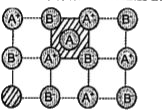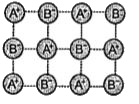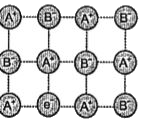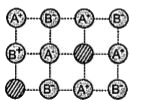Schottky defect lowers the density of ionic crystals while Frenkel defect does not. Discuss.
To discuss why the Schottky defect lowers the density of ionic crystals while the Frenkel defect does not, we need to understand the nature of both defects and their effects on the crystal lattice.
1. Definition of Schottky Defect:
- The Schottky defect occurs when equal numbers of cations and anions are missing from the crystal lattice. This results in vacancies in the lattice structure.
2. Effect on Mass and Volume:
- When cations and anions are removed, the total mass of the crystal decreases because some of its constituent ions are missing.
- However, the volume of the crystal remains largely unchanged because the remaining ions still occupy the same space in the lattice.
3. Density Calculation:
- Density is defined as mass divided by volume (Density = Mass/Volume).
- Since the mass decreases (due to the removal of ions) and the volume remains constant, the overall density of the crystal decreases.
4. Definition of Frenkel Defect:
- The Frenkel defect occurs when a cation (usually smaller in size) leaves its lattice position and occupies an interstitial site within the crystal structure. This creates a vacancy at the original lattice position but does not result in the loss of mass from the crystal.
5. Effect on Mass and Volume:
- In the case of the Frenkel defect, although there is a vacancy created by the missing cation, the total mass of the crystal remains unchanged because no ions are removed from the crystal; they are just relocated.
- The volume of the crystal also remains unchanged since the ions are still present within the lattice, just in different positions.
6. Density Calculation:
- Since the mass of the crystal does not change and the volume remains constant, the density of the crystal does not change in the case of the Frenkel defect.
Conclusion:
- The Schottky defect lowers the density of ionic crystals because it results in a loss of mass without a corresponding loss of volume. In contrast, the Frenkel defect does not affect the density because the mass remains unchanged, even though there are vacancies created.
- The Schottky defect occurs when equal numbers of cations and anions are missing from the crystal lattice. This results in vacancies in the lattice structure.
- When cations and anions are removed, the total mass of the crystal decreases because some of its constituent ions are missing.
- However, the volume of the crystal remains largely unchanged because the remaining ions still occupy the same space in the lattice.
- Density is defined as mass divided by volume (Density = Mass/Volume).
- Since the mass decreases (due to the removal of ions) and the volume remains constant, the overall density of the crystal decreases.
- The Frenkel defect occurs when a cation (usually smaller in size) leaves its lattice position and occupies an interstitial site within the crystal structure. This creates a vacancy at the original lattice position but does not result in the loss of mass from the crystal.
- In the case of the Frenkel defect, although there is a vacancy created by the missing cation, the total mass of the crystal remains unchanged because no ions are removed from the crystal; they are just relocated.
- The volume of the crystal also remains unchanged since the ions are still present within the lattice, just in different positions.
- Since the mass of the crystal does not change and the volume remains constant, the density of the crystal does not change in the case of the Frenkel defect.
- The Schottky defect lowers the density of ionic crystals because it results in a loss of mass without a corresponding loss of volume. In contrast, the Frenkel defect does not affect the density because the mass remains unchanged, even though there are vacancies created.
Similar Questions
Knowledge Check
The crystal showing Frenkel defect is:
A B
B C
C D
D
Schottky defect is likely to be found in
AAgIBNaCICZnSDZnO
Which point defect lowers the density of a crystal?
View SolutionDue to Frenkel defect, the density of ionic solids:
View SolutionWhy does Schottky defect decrease the desity of a crystal ?
View SolutionWhich has Frenkel defect ?
View SolutionDue to Frenkel defect, the density of ionic solids:
View SolutionFrenkel defect does not change the density of the ionic crystal whereas, Schottky defect lowers the density of ionic crystal. Give a reason.
View Solution
